Click on images to enlarge

infestation (Photo: Sheldon Navie)
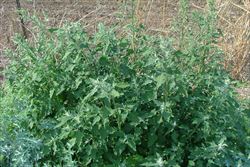
habit (Photo: Sheldon Navie)

habit (Photo: Sheldon Navie)
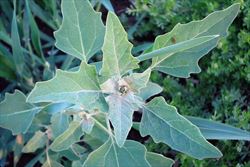
broader lower leaves with bluntly-toothed to slightly-lobed margins (Photo: Sheldon Navie)
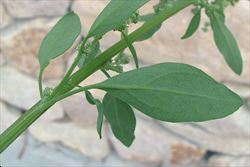
close-up of stem and undersides of narrower upper leaves (Photo: Sheldon Navie)
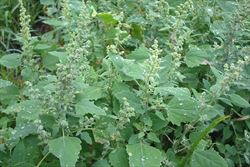
flower clusters (Photo: Sheldon Navie)

tiny greyish-greenish flowers with yellow stamens (Photo: Sheldon Navie)

close-up of tiny flowers (Photo: Greg Jordan)
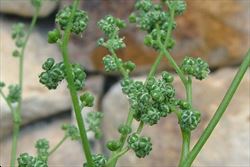
immature fruit (Photo: Sheldon Navie)
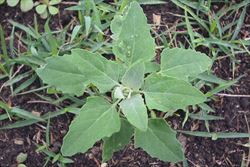
young plant (Photo: Sheldon Navie)
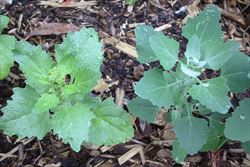
comparison of nettle-leaf goosefoot (Chenopodium murale), with deeply-toothed greenish leaves on the left, and fat hen (Chenopodium album), with shallowly-toothed bluish-green leaves on the right (Photo: Sheldon Navie)
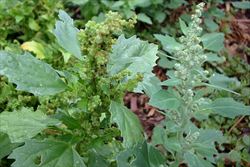
comparison of nettle-leaf goosefoot (Chenopodium murale), with green leaves and flowers on the left, and fat hen (Chenopodium album), with greyish-green leaves and flowers on the right (Photo: Sheldon Navie)
Scientific Name
Chenopodium album L.
Synonyms
Chenopodium album L. subsp. albumChenopodium album L. subsp. hastatum (C. Klinggr.) Graebn.Chenopodium album L. var. albumChenopodium album L. var. hastatum C. Klinggr.Chenopodium album L. var. striatiforme (Murr) MurrChenopodium browneanum Roem. & Schult.Chenopodium concatenatum Thuill. subsp. striatiforme MurrChenopodium lanceolatum R. Br.Chenopodium probstii AellenChenopodium probstii Aellen forma probstiiChenopodium striatiforme Murr
Family
Chenopodiaceae
Common Names
Antigua hay grass, baconweed, blue weed, chou grass, common lambsquarters, fat hen, fat-hen, fathen, frost bite, goosefoot, lamb's quarters, lamb's-quarters, lambsquarters, mealweed, Nandi blue grass, Nawai grass, netseed lambsquarters, pigweed, pitseed goosefoot, silver grass, white goosefoot, white pigweed, wild spinach
Origin
This species possibly originated in Europe, although its exact native range is obscure. It is now very widespread throughout the temperate and tropical regions of the world (i.e. it is cosmopolitan).
Naturalised Distribution
Widely naturalised throughout large parts of Australia, but most common in wetter temperate and sub-tropical regions. It is widespread in eastern Queensland, New South Wales, the ACT, Victoria, Tasmania, South Australia and south-western Western Australia. Also naturalised in other parts of Western Australia and Queensland, in the southern parts of the Northern Territory, and on Norfolk Island and Lord Howe Island.
Notes
Fat hen (Chenopodium album) is regarded as an environmental weed in New South Wales, Victoria, Western Australia and the Northern Territory. This species is primarily known as a common and widespread weed of agricultural areas and habitation in temperate and sub-tropical regions, but it also invades natural vegetation (particularly in temperate regions). It is one of the most widely distributed weed species in the world and is a very successful coloniser of habitats that have been recently affected by disturbance.
Fat hen (Chenopodium album) grows in bushland, riparian vegetation, cleared areas and along roadsides in Victoria, and has been recorded from several conservation areas in this state (e.g. Morwell National Park, Phillip Island Nature Park, Lysterfield Lake Park and Churchill National Park). It has also been recorded in numerous conservation areas in South Australia (e.g. Marino Conservation Park, Moana Sands Conservation Park, Horsnell Gully Conservation Park, Muloowurtie Conservation Reserve, Onkaparinga River National Park, Flinders Chase National Park and Belair National Park) and from Tasman National Park in Tasmania.
In addition, it is listed as an environmental weed in the wider Sydney and Blue Mountains region in New South Wales and has been recorded in relatively intact native vegetation in south-western Western Australia. It has also been recorded on Rat Island, in the Houtman Abrolhos Islands, off the coast of Geraldton.

